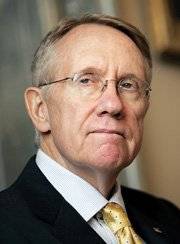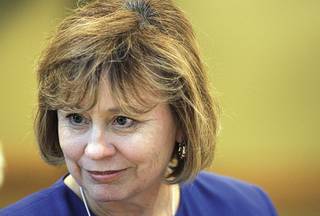Sunday, Nov. 15, 2009 | 2 a.m.

Harry Reid
Sun Coverage
Sun Blogs
As Senate Majority Leader Harry Reid prepares to bring landmark health care legislation to the Senate floor this week, the Nevada Republicans seeking to replace him next year are on the same page, parroting their party’s talking points on the issue.
The candidates whose campaigns have attracted early attention see Democratic reform proposals as a naked government power grab that they say will mean higher taxes and the collapse of the private insurance industry. To control rising costs, they favor tort reform, interstate competition among health insurers and the elimination of state insurance mandates.
On its face, that kind of uniformity represents a missed opportunity for an open field of about a dozen Republicans battling for voter recognition — and campaign donations. Health care, after all, is at the top of the national agenda.
But in the smaller world of primary politics, experts say, separating from the herd on health care represents risk.
“If you are distinguishing yourself on health care, you are outside the Republican box,” said Eric Herzik, a University of Nevada, Reno, political scientist and a registered Republican. “That’s a risky place to be in the primary. This is an issue where the safe answer moves you onto the next issue.”
To that point, a Review-Journal poll last month found that the overwhelming majority of Nevada’s Republicans — 86 percent — oppose the Obama administration’s health care proposals. A survey conducted by the Pew Research Center for the People & the Press this month found the same level of Republican opposition nationally.
As Herzik put it: “This isn’t the issue that defines the Republican electorate.”
Conversely, Democrats — and Reid in particular — are under intense pressure to pass health care legislation. Former President Bill Clinton’s visit to Capitol Hill last week underscored that urgency. He reminded Senate Democrats of the consequences of his failed reform effort 15 years ago: The party lost control of Congress in that year’s midterm elections, and health care costs and the number of uninsured Americans increased.
Notably, Reid asked Clinton to speak to his caucus. “It’s not important to be perfect here. It’s important to act, to move, to get the ball rolling,” Clinton told senators. “It’s a big, complicated, organic thing. But the worst thing to do is nothing.”
Both parties will need a growing bloc of independent voters in Nevada to win in 2010.
Reid has pledged to include in his health legislation a Medicare-like, government-run public option to compete with private insurers. According to a poll last month by the liberal Progressive Change Campaign Committee, a majority of unaffiliated voters here favor a public option — and a third say they would be less likely to vote for Reid if he fails to include one in the final bill.
Those numbers — and the sentiment behind them — could hurt the Republican primary victor if he or she doesn’t offer more substantive alternatives, Herzik said.
“Republicans run a risk of simply being the party of no — of the free market, of unregulated economies,” he said. “That’s a tough sell right now.”
Still, other trends run in Republicans’ favor in Nevada. Pew found that while Democrats narrowly lead Republicans in a generic congressional matchup, support for incumbents is near an all-time low, on par with ratings in 1994 and 2006, when the party in power lost control. The group also found that those opposed to health care reform are more enthusiastic than supporters about casting ballots in 2010.
Some of Reid’s Republican challengers have tried to capitalize on that trend by holding health care town-hall meetings.
Danny Tarkanian, a lawyer and son of the famous former UNLV basketball coach, went a step further. He’s backing a ballot initiative that — in theory — would allow voters to decide whether they want a public option in Nevada.
Whether a public option will emerge is still unclear.
For now though, candidates would much rather talk about another crisis: the economy.
“The most important thing we should be talking about is jobs,” said Sue Lowden, a Senate candidate and former chairwoman of the Nevada Republican Party. “If Nevadans had jobs, they could afford health care or it would come with those jobs.”
Further making the point that this isn’t their issue, Sharron Angle, a former Reno assemblywoman also challenging Reid, called health care a distraction.
“This is a way to take our focus off the economy,” she said. “Everyone should understand health care is not the No. 1 issue. The economy is the No. 1 issue ... People want to know what’s going to happen with their jobs.”

